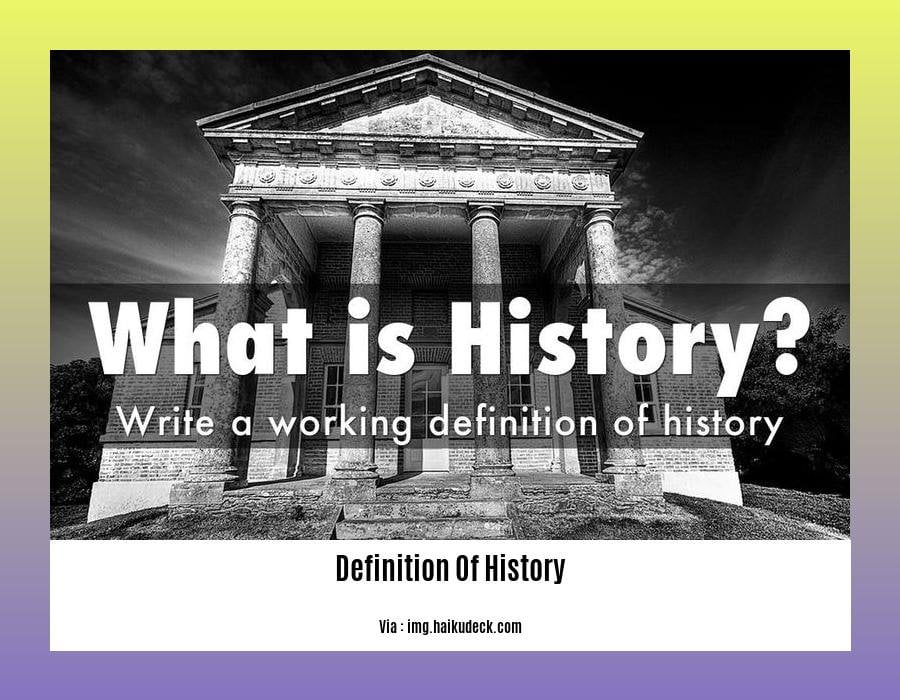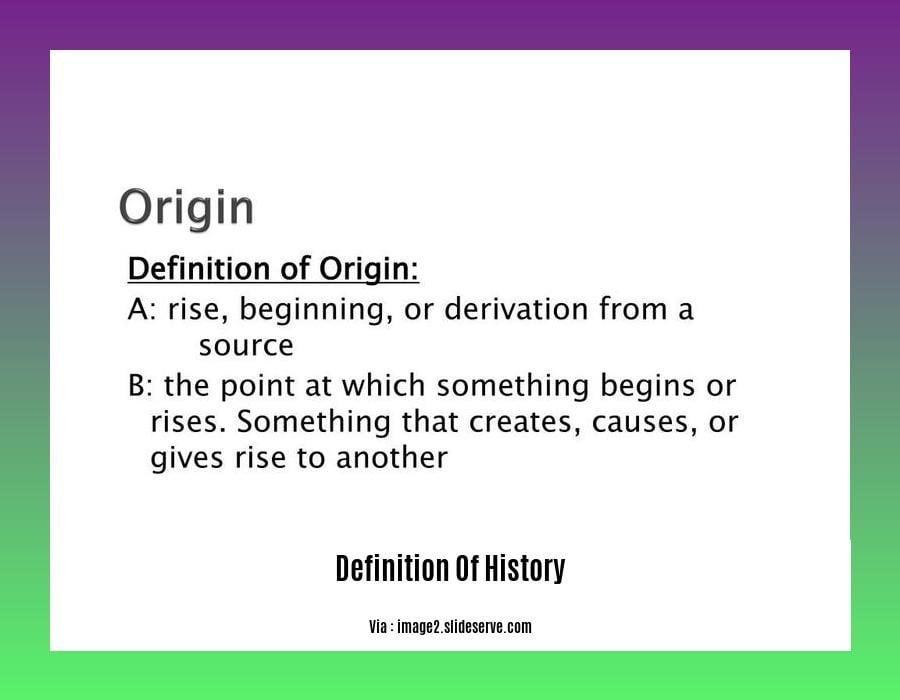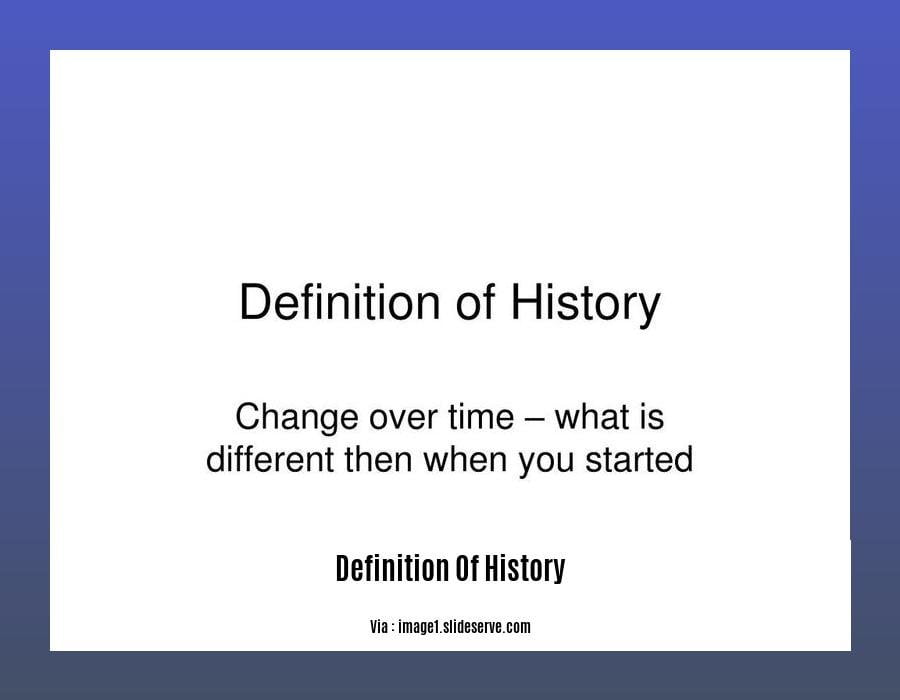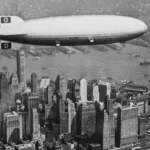History: it’s more than just dusty textbooks and dates you try to memorize. Imagine a vibrant tapestry, woven with threads of triumph, disaster, innovation, and the intricate lives of everyday people. That’s history—a dynamic narrative that connects us to the past, illuminates the present, and offers guidance for the future.

Definition of History
So, what exactly is history? It’s not simply a collection of facts, names, and dates, though those are essential building blocks. History is an ongoing investigation, a quest to understand the human story in all its messy complexity. It’s about piecing together the past using fragments of evidence like letters, artifacts, and oral traditions, always acknowledging that new discoveries can shift our understanding, just as fresh perspectives reinterpret old narratives.
The very act of defining history is an evolving conversation. Some experts believe it’s the study of significant events and powerful individuals who shaped the world as we know it. Others argue that history resides in the everyday experiences of ordinary people, their struggles and triumphs, their beliefs and values. And still, others emphasize the powerful currents of social and cultural forces, the rise and fall of empires, or the evolution of ideas that reverberate through time.
What is the best definition of history?
There may not be one “best” definition of history. It’s a multifaceted concept, constantly being researched, analyzed, and reinterpreted. However, a comprehensive approach recognizes history as both an ongoing investigation of the past and a dynamic narrative that connects us to the present and future.
Here are some important things to keep in mind:
- History is a process of inquiry. Like detectives meticulously gathering evidence, historians seek clues from the past to paint a picture of bygone eras.
- History is a story, but not just any story. It aims for accuracy, relying on verifiable evidence and critical analysis. Yet, historical narratives can differ based on interpretation and the perspectives of those who construct them.
- History is an ongoing conversation. New discoveries and evolving social contexts ensure that our understanding of the past is always subject to revision and debate.
What is your own definition of history?
As you delve deeper into the study of history, you’ll likely develop your own unique perspective. Don’t shy away from asking questions, challenging assumptions, and exploring multiple viewpoints. Engage with the past on your own terms, recognizing that history is a personal journey as well as a collective human experience. Ask yourself:
- What stories resonate with me?
- What events or individuals pique my curiosity?
- How does understanding the past shape my understanding of the present and my hopes for the future?
Embrace the thrill of discovery as you unravel the tapestry of time, uncovering the threads that connect you to the broader human story.
- Historians have tried to figure out the definition of history, and one historian said it is “the study of what man has done”.
- The definition of history from a play titled “The History Boys” says “the past is a foreign country: they do things differently there.”
- One of the definitions of history comes from a painting titled “Les Demoiselles d’Avignon.” It depicts five naked women who look like they are from different time periods, which showcases all of history is made up of different peoples.

What is the original meaning of history?
The word “history” itself offers clues to its original meaning. Derived from the ancient Greek word “historia,” it signified a process of inquiry, a quest for knowledge about the past. Early historians approached their work as detectives, piecing together evidence and seeking explanations for past events.
Over time, the scope of history expanded. It evolved beyond mere chronicles of rulers and battles to encompass the richness and complexity of the human experience. Today, history encompasses a wide range of disciplines, from social and cultural history to economic, environmental, and technological history.
Here are some key takeaways:
- History initially emphasized investigation and documentation.
- It has broadened to include a deeper understanding of human experiences in all their forms.
- While history strives for factual accuracy, it’s essential to recognize that human interpretation and diverse viewpoints shape historical narratives.
What is the main definition of world history?
World history zooms out to examine the grand narrative of humanity, transcending national borders and cultural boundaries. It seeks to understand the interconnectedness of human societies across time and space, exploring events and trends that have left a global impact.
One prominent framework for understanding world history is modernization theory. This approach suggests that Western societies, with their economic and technological advancements, have charted a course for global development. However, it’s crucial to recognize that modernization theory is just one perspective among many. Critics argue that it privileges a Western-centric view of history, potentially overlooking the unique trajectories and contributions of other cultures and civilizations.
Here’s a quick recap:
- World history focuses on events and trends with a global reach. It explores how different parts of the world have interacted and influenced each other throughout history.
- The idea of human unity is central to world history. From ancient philosophers to contemporary scholars, the concept of a shared human story transcends cultural and geographical divides.
- Modernization theory offers one lens through which to view world history. While it provides a framework for understanding global development, it’s essential to engage with alternative perspectives and challenge dominant narratives.
Which best defines history?
Given the complexities and nuances we’ve explored, it’s clear that history defies a single, definitive definition. It’s a dynamic and multifaceted field of study that continually evolves alongside new discoveries, evolving methodologies, and shifting social perspectives. Yet, at its core, history remains a pursuit of understanding—an ongoing endeavor to unravel the intricate tapestry of the past to gain insights into the present and shape a more informed future.
What is the best definition of a history essay?
A well-crafted history essay goes beyond merely recounting facts and dates. It’s a piece of analytical writing that delves into a specific historical event, period, or theme, crafting a compelling narrative supported by evidence and interpretation.
Here are some key elements of a strong history essay:
- A Clear Argument: The essay should present a central claim or thesis statement that guides the reader through the historical analysis.
- Evidence-Based Analysis: Supporting arguments should be grounded in credible historical evidence, such as primary sources (e.g., letters, diaries, government documents) and secondary sources (e.g., scholarly articles, books).
- Historical Context: The essay should situate the topic within its historical setting, exploring relevant social, political, economic, and cultural factors that shaped events and influenced interpretations.
- Multiple Perspectives: Acknowledging and engaging with diverse viewpoints enriches the analysis and demonstrates a nuanced understanding of the past.
- Clarity and Organization: A logical structure, clear writing style, and proper citations are crucial for effectively communicating historical insights.
What is the best definition of big history?
Imagine zooming out from the specific events and individuals that typically occupy history books. Big history takes a cosmic perspective, exploring the grand narrative of the universe from the Big Bang to the present. It seeks to connect the dots between seemingly disparate fields like cosmology, geology, biology, and human history.
Here are some key characteristics of big history:
- Interdisciplinary Approach: Big history draws upon insights from various academic disciplines to create a comprehensive understanding of the past.
- Vast Timescales: It examines events and processes that unfold over millions and even billions of years.
- Emphasis on Interconnectedness: Big history emphasizes the interconnectedness of all things, from the formation of stars to the evolution of life on Earth.
What does it mean to “do history?”
To “do history” is to actively engage in the process of historical inquiry. It’s about more than just passively absorbing information from textbooks; it’s about asking critical questions, seeking out evidence, and constructing your own understanding of the past.
Here are some key aspects of “doing history”:
- Asking Questions: Historians start by identifying questions or problems they want to explore.
- Gathering Evidence: They seek out primary and secondary sources that can shed light on their research questions.
- Analyzing Sources: Historians critically evaluate the reliability, bias, and context of their sources.
- Interpreting Evidence: They develop interpretations and draw conclusions based on their analysis of the evidence.
- Communicating Findings: Historians share their research through writing, presentations, and discussions.
Who Defined History As…?
Throughout history, numerous scholars, philosophers, and thinkers have grappled with the question of history’s meaning and purpose. Let’s delve into a few prominent figures who have shaped our understanding of the past:
- Thucydides (c. 460 – c. 400 BCE): Often hailed as the “father of scientific history,” Thucydides emphasized the importance of impartiality and critical analysis in historical writing. His account of the Peloponnesian War set a new standard for historical accuracy and objectivity.
- Sima Qian (c. 145 – c. 86 BCE): A Chinese historian of the Han dynasty, Sima Qian is renowned for his monumental work, Records of the Grand Historian. His comprehensive approach to history encompassed biographies, treatises on music, astronomy, and economics, providing a panoramic view of Chinese civilization.
- Ibn Khaldun (1332–1406): An Arab scholar from North Africa, Ibn Khaldun is considered a pioneer of historiography, sociology, and economics. His masterpiece, Muqaddimah (“Introduction” to world history), explored the cyclical rise and fall of civilizations, emphasizing social, economic, and environmental factors.
- Voltaire (1694–1778): A leading figure of the Enlightenment, Voltaire championed reason, tolerance, and freedom of thought. His historical writings often challenged traditional narratives and championed the role of individual liberty in shaping human progress.
- Edward Gibbon (1737–1794): An English historian best known for his monumental work, The History of the Decline and Fall of the Roman Empire, Gibbon’s detailed prose and sweeping analysis of Roman civilization have captivated readers for centuries.
- Leopold von Ranke (1795–1886): A German historian who championed the pursuit of objective truth in history, von Ranke emphasized the rigorous examination of primary sources and the importance of avoiding present-day biases when interpreting the past.
What is the definition of history according to Burkhardt?
Jacob Burckhardt (1818–1897), a Swiss historian of the 19th century, offered a distinctive perspective on history, emphasizing the role of culture and the interconnectedness of human experience.
Here are some key takeaways from Burckhardt’s approach to history:
- History as a Tapestry: Burckhardt envisioned history not as a linear progression of events but as a rich and intricate tapestry woven together from diverse strands of human activity, including art, religion, politics, and daily life.
- The Significance of Culture: He believed that culture played a vital role in shaping historical events and understanding the past. Art, architecture, literature, and philosophy provided essential insights into the spirit of an age.
- Interconnectedness: Burckhardt emphasized the interconnectedness of different aspects of human experience, arguing that political, economic, and social forces all contributed to the shaping of history.
- The Importance of Context: He stressed the need to understand historical events within their specific time and place, recognizing that the past is fundamentally different from the present and requires careful interpretation.
Burckhardt’s approach to history has continued to influence generations of historians, reminding us to look beyond dry political narratives and delve into the richness and complexity of human cultural expression to fully grasp the tapestry of the past.
- Unveiling the Enigma: Mansoureh Khojasteh Bagherzadeh’s Public Appearances & Private Life in Iran - July 18, 2025
- Unveiling the Mystery: Mansoureh Khojasteh Bagherzadeh’s Husband: A Rare Glimpse into a Private Life - July 18, 2025
- Unveiling Masoud Khamenei’s Mother: Power, Influence, and Iran’s Future - July 18, 2025
















